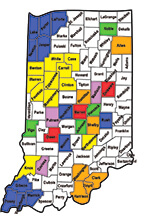Communities to learn how to set up disaster preparedness group
January 12, 2015
 |
|
This map of Indiana shows counties, highlighted in color, that have established a COAD, short for community organizations active in disaster. Some COADs are composed of several adjoining counties. (Purdue Agricultural Communication graphic/Abby Hostetler) |
WEST LAFAYETTE, Ind. - Purdue Extension is helping to provide training in January so that Indiana communities can organize to better prepare for and recover from disasters.
The free, one-day training is designed to encourage communities to form a COAD, an acronym for community organization active in disaster. The training will be conducted by leaders of the umbrella Voluntary Organizations Active in Disaster, of which Purdue Extension is a member.
"Communities that are organized to prepare for, respond to and recover from a disaster do so because they plan for disasters," said Abby Hostetler, an Extension Disaster Education Network communications specialist and adviser to COADs. "Experience shows that communities with a COAD recover more quickly than those that don't."
The first two meetings, under the title of "Building Blocks of a COAD: Forming a COAD in your Community," will be held Jan. 28 in Rochester and Jan. 29 in Seymour, both from 10 a.m. to 3 p.m. The Rochester meeting will be at the Fulton County Extension Office on the county fairgrounds at 1009 W. 3rd St. The Seymour meeting will be at the Community Foundation of Jackson County office, 107 Community Drive. The training in Seymour is limited to 30 participants.
The meetings are open to the public. Meetings were scheduled in northern and southern Indiana in an effort to make them accessible to those interested throughout the state.
A COAD is a network of volunteer organizations and government agencies communicating and sharing resources to reduce the impact of disasters. About one-third of the 92 counties throughout Indiana have a COAD or are part of one that serves multiple counties. All counties have had at least one federally declared disaster in the past 10 years, and most have faced smaller disasters.
The training will include guest speakers from emergency management agencies and communities that have a COAD. It will offer details on how to start a COAD and explain its goals and objectives.
"Anyone participating will gain the knowledge to work with local organizations who want to improve the resiliency of their communities," Hostetler said.
While the public is invited, organizers are encouraging people to attend as a representative of an organization. Typical groups involved in COADs are volunteer, civic and faith-based organizations, and agencies that include emergency management, public health workers and first responders as well as others. Representatives of foundations, social services organizations, businesses and others also are welcome.
Co-sponsor of the training is Catholic Charities - Archdiocese of Indianapolis.
To register to attend a meeting, contact Hostetler at alillpop@purdue.edu or 765-494-4390.
Other meetings scheduled for later in the year, with locations to be determined:
* April 22 and 23: "Supercharge Your COAD: The Functions of a COAD and Why They are Important."
* July 29 and 30: "Follow the Leader: Finding and Cultivating Leadership in Your COAD."
* Oct. 28 and 29: "Marketing and Advocacy for Disaster Awareness."
Writer: Keith Robinson, 765-494-2722, robins89@purdue.edu
Source: Abby Hostetler, 765-494-4390, alillpop@purdue.edu
Ag Communications: (765) 494-2722;
Keith Robinson, robins89@purdue.edu
Agriculture News Page

